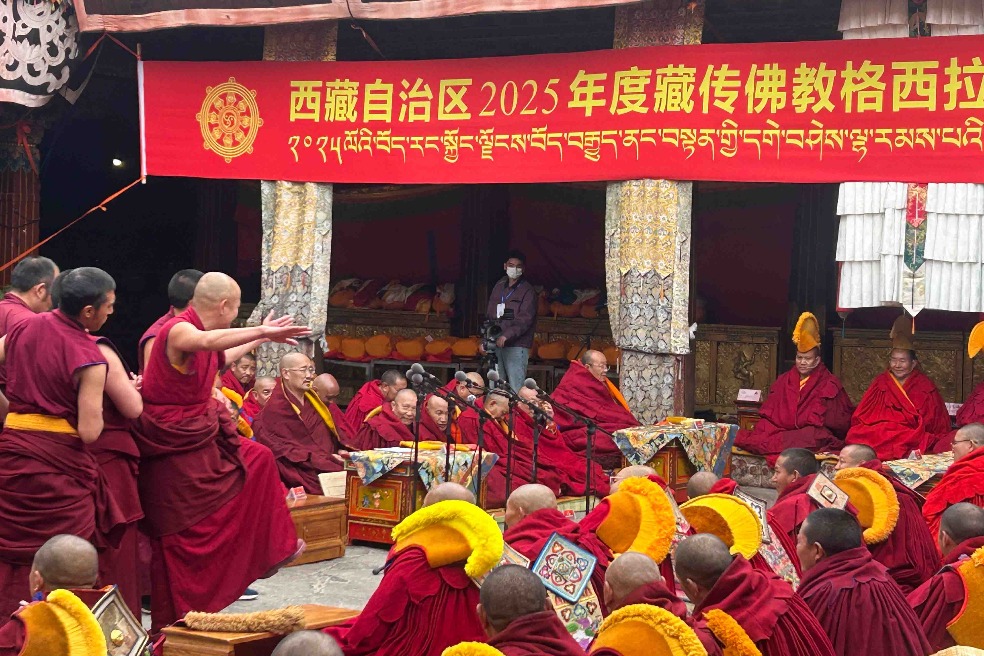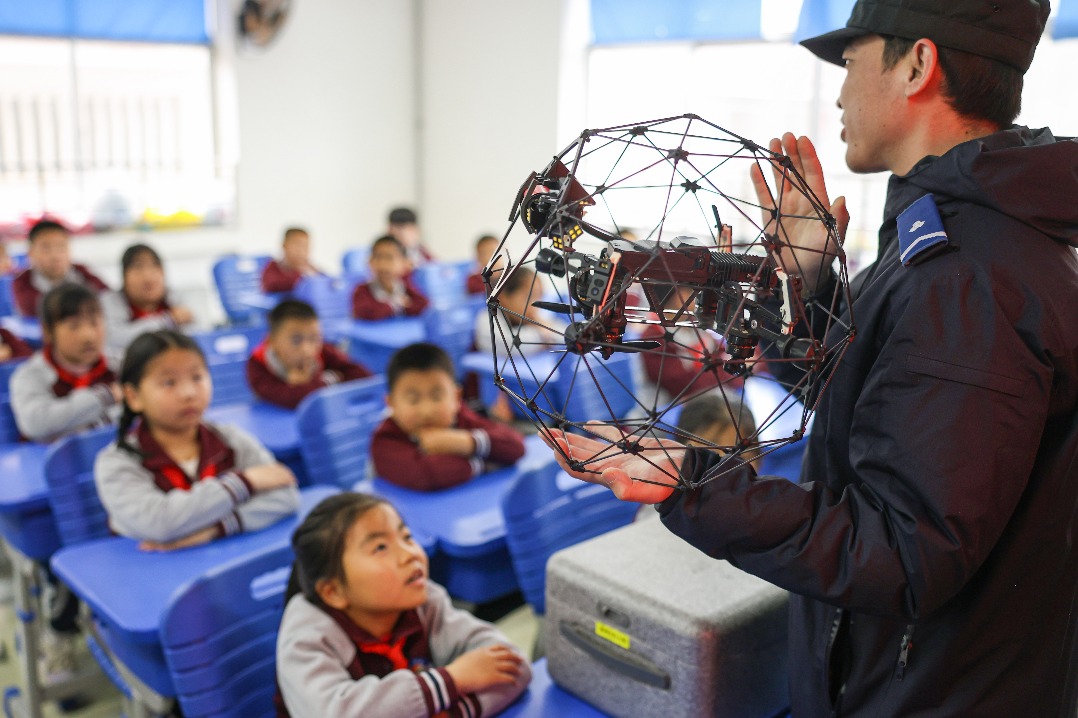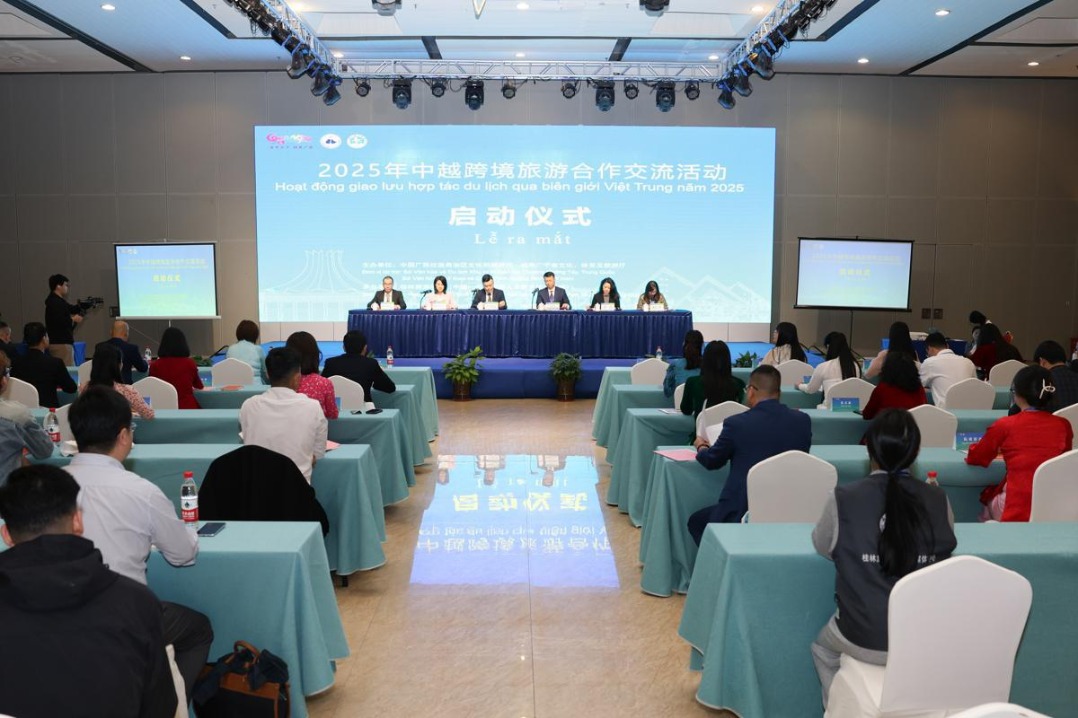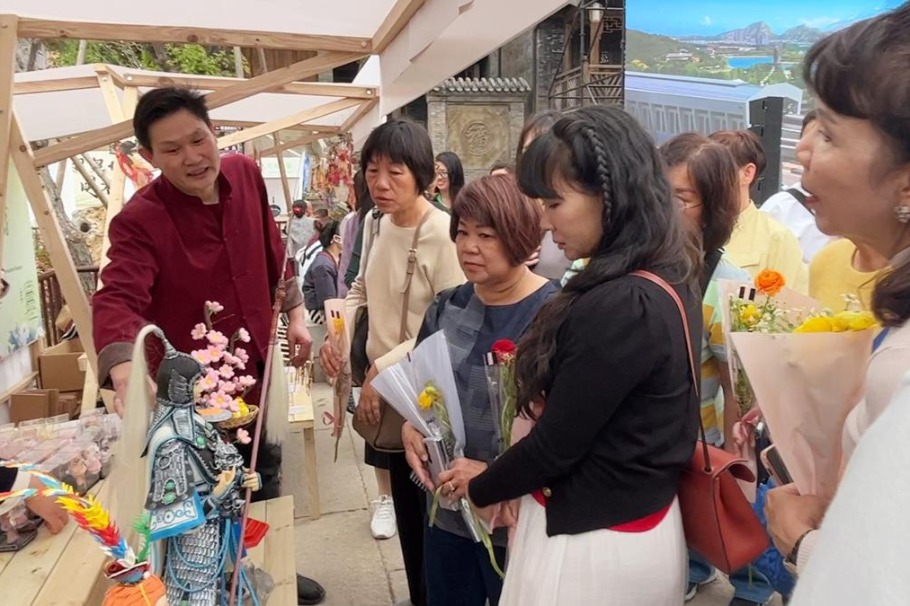DPP breaking apart families for political gain
Actions of island's authorities in splitting up cross-Strait couples against human rights

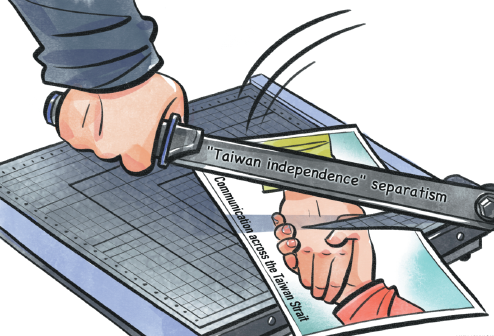
Editor's note: The Taiwan question is a key focus for China and the international community. China Daily is publishing a series of reports to track hot Taiwan-related topics and address disinformation from the Democratic Progressive Party administration.
Chen Li-chun, a young artist from Taiwan, created a caricature to satirize the recent actions of Taiwan's Democratic Progressive Party authorities in breaking up cross-Strait marriage families, which she views as a violation of human rights.
Liu Zhenya, a social media influencer from the mainland with nearly 500,000 followers on short video platform Douyin, who is also known as Ya Ya in Taiwan, was recently forced by the DPP authorities to leave the island. Liu and her husband, who was born in Taiwan, have three children.
Authorities in Taiwan revoked her residence permit and forced her to leave the island on March 25, accusing her of "jeopardizing security and social stability" because of her previous comments on reunification.
Chen said that upon seeing news footage of Liu bidding farewell to her husband and children at the airport in Taiwan and witnessing her young daughter in tears, unwilling to be separated from her mother, she felt compelled to create the picture to express her anger and sadness.
Hailing from Taiwan's Changhua and currently pursuing her postgraduate studies in art at Jinan University in Guangdong province, Chen depicted Taiwan's leader, Lai Ching-te, in a gesture similar to the Statue of Liberty in her artwork, mocking the so-called democracy of the DPP authorities.
In the picture, Lai is portrayed holding a book labeled "Freedom" in his left hand while raising a bloodstained spear in his right hand, pointing toward Liu's embracing family below. Slogans with "Go back" from separatists float in the air.
"If freedom entails authorities harming unarmed individuals and resorting to violence against truth-speakers, we would rather abandon such 'freedom'," Chen said.
She shared the picture on social media to show support for Liu and other cross-Strait families, receiving both backing and criticism. Chen said she hopes to tell Liu that "You are not alone".
Since March, a total of five mainland spouses residing in Taiwan, who are pro-reunification online influencers like Liu, have been forced by the island authorities to leave. This has led to the separation of families in cross-Strait marriages, sparking protests across the Strait.
Earlier this month, the authorities in Taiwan once again demanded that mainland spouses renounce their mainland household registration, otherwise, they would risk losing their "settlement residency" status in Taiwan.
According to data from the island authorities, there are 360,000 mainland spouses in cross-Strait marriages, out of which over 140,000 individuals have obtained residency in Taiwan.
Taiwan leader Lai has referred to the mainland as "foreign hostile forces" and outlined 17 "strategies" last month to counter so-called threats from the mainland. These include raising public awareness about "risks" associated with mainland travel, applying for mainland residence permits and regulating behaviors of Taiwan entertainers on the mainland.
Anxious moves
Liu Guoshen, a professor of cross-Strait relations at Xiamen University, said Lai is actually in a dilemma both internally and externally, and his recent series of manipulations in cross-Strait relations reflect his anxiety and fear.
From the perspective of cross-Strait relations, in recent years, the mainland's governance ability over Taiwan has been increasing, and the DPP, which holds an "independence" stance, feels extremely fearful and anxious about the future, Liu said.
In this situation, in order to appease the "pro-independence" forces and "reduce" the pressure from the mainland, it is very important for the DPP to escalate confrontation between the two sides, he said.
Another reason is that the current administration in the United States has been too preoccupied to pay attention to Taiwan, causing great anxiety for the DPP. In this situation, the DPP has actually implied a sense of "complaining" to the US, he added.
Internally, the opposition Chinese Kuomintang and the Taiwan People's Party have been confronting the DPP in the "legislature" for nearly a year, and recently, Lai's budget proposal has been consistently suppressed, which has left him feeling frustrated, Liu said.
In Taiwan's "legislature", the opposition has formed a fragile but effective majority. The main opposition KMT, which promotes cross-Strait exchanges, holds 52 of the 113 legislative seats, together with the smaller TPP, which has eight seats, and two independents.
The DPP, which held a legislative majority from 2016 to 2024, now holds 51 seats, which led to a sweeping recall campaign this year aimed at unseating opposition lawmakers, in a bid to regain control of the "legislature".
Chou Hsi-wei, a former magistrate of Taipei county and vice-chairman of Want Want China, a Taiwan-based enterprise, said that Lai's push for a recall campaign is because he is afraid of losing the next election and people rising up in resistance.
"Therefore, he wants to control the majority in the 'legislature' to amend laws, and then completely control the people," he said.
Chou said that Lai's governance is very poor and in order to win the next election, his current policy which treats the mainland as an enemy, aims at creating estrangement, hatred and misunderstanding between people of the two sides.
It won't last long for a ruling party in Taiwan to adopt such a divisive approach, causing people to be unable to engage in business and have friendly interactions with their mainland compatriots as these are all regressive and inhumane practices, he said.
"Elections have produced a demon today; he is not a good person, and he is certainly not someone who will take care of the people," Chou said. "He completely denies himself as Chinese, how long can such practices deceive people?"
The DPP's practice of suppressing mainland spouses and forcing them to return to the mainland is extremely "ugly", completely violating human nature and human rights, he said, adding that people's grievances will surface during the coming elections.
Despite the DPP's moves to obstruct cross-Strait exchanges, they will not succeed, he added.
According to the Taiwan Affairs Office of the State Council, in 2024, there were 4.41 million cross-Strait visits, representing a year-on-year increase of 53.8 percent.
Liu, the mainland professor, said the more the Lai administration intimidates the people of Taiwan and creates obstacles for cross-Strait exchanges, the more the mainland will go against the tide.
"We should consider, manage and govern the Taiwan question from the perspective of promoting a better life for the Chinese people on both sides of the Strait, further improving policies and measures to care for our Taiwan compatriots," Liu said.
Regarding Taiwan's recent investigation into residence permits on the mainland, the mainland is taking a different approach by announcing more convenient measures including online processing for lost documents without the need for intermediary agencies, he said.
zhangyi1@chinadaily.com.cn
- China, Vietnam hold 9th border defense friendship exchange
- Chinese researchers develop smart wearable device to aid the blind
- Xinjiang city upgrades public toilets with robots, new tech
- Xi meets Malaysia's king
- Beijing sees 61% surge in inbound tourists in Q1
- Xi attends welcome ceremony held by Malaysia's king
















